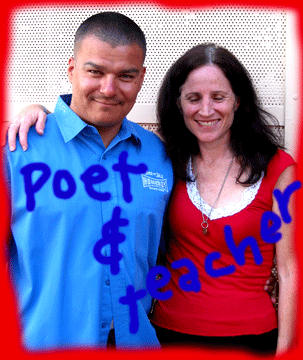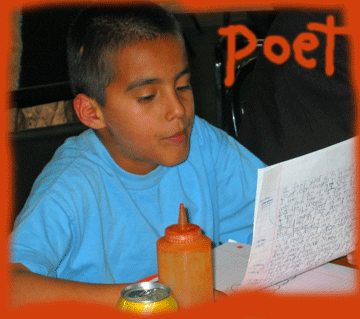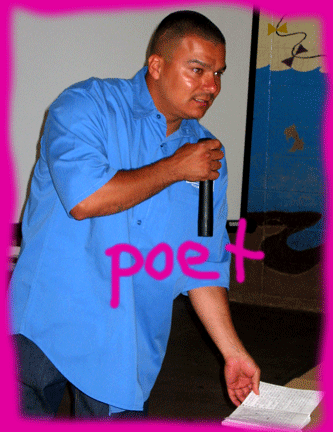
Today’s excellent LA Times Column One story by Erika Hayasaki is about my friend, novelist Leslie Schwartz, and the writing class that she first began as part of the PEN USA-sponsored Homeboy Stories Project that I originally posted about here and here last spring.

The story focuses on two of the class members—one a talented and troubled ten-year old named Freddy, the other an ex-con, ex-homeboy in his early 30’s named Hector Verdugo who, with Leslie’s help, has discovered he has real promise as a writer.

If you can make the time to read the story (and look at Annie Wells’ wonderful photos), I promise, you won’t be sorry.

Hey, I’m all for success for people who fell on hard times or live in crime areas. However, what kind of livings are they going to make in poetry? Require them to take accounting courses at the same time. It’s not as fun, but you can find more jobs.
LA Res, surely this has something to do with Iraq. Please tell us how.
Let’s spend the Iraq war money on the construction of schools, vocational training centers, parks and recreational centers in this country. So a kid like the one in this story has some place to go after school instead of hanging out on the street with a bunch of gang-bangers. As he gets older he can attend a vocational training center, and then he will become another employed taxpayer. But I guess bombing Iraq, then spending billions of dollars rebuilding Iraq makes more fiscal sense. I’m not an economist so I may not grasp the concept of the return of our investment in Iraq.
LA Res, you remind me of something that my wife said once. She wanted to go to Hawaii, but I didn’t want to spend the money, so she asked if we could take the money that we didn’t spend by not going and spend it on something else. She failed to realize that not spending on one hand did not produce cash flow on the other.
There is a return on investment in Iraq. It’s called freedom, and there is no price that one can place on that.
Great story, and the Times gave it a lot of space, too. But it ends with Freddy’s fate ambiguous — wonder what happens to him? L A Res is actually correct on this one: writing about his life is a good start to change, but vocational courses are a more practical long-term solution to his getting out of the gangs he’s already started to join.
Leslie is brave, admitting she herself started battling at the young age of 11 — many people do turn to writing as a means to channel their bottled-up frustrations and lives. I also wasn’t aware that Father G was battling cancer, and is into his 4th year where the expected survival rate is only six. Hope his prayers for a miracle are answered.
I want these guys to go with me in dealing with the IRS. Maybe they could encourage the revenue officers to see things more our way.
I was impressed by the content and the structure of a column by Erica Hayasaki. This story is talking about the soul, not the food that will be perished eventually. You guys, do not be afraid of giving applaud to these Giants. Their lives are meaningful to us because they have suffered more than all of us have.
I had a chance to visit the San Gabriel Mission last year.
Now, I have realized what that Mission is through this column about Father G.
I am very grateful for what I have received from this story. Sometimes we feel like nobody around us. We will help each other sooner or later and become a good friend for the purity with which we are going to the next level.
soljaboy superman pictures
me n eds pizza fresno 93720
tony stewart girlfriend 2008
basketball stat box score sheet blank
1970 plane crash marshall univ
printable cursive nameplate
tgi fridays menu appetizers
donk rides for sale
blank venn diagram
kentucky fried chicken menu prices
graffiti tag letters
skinny default layouts headphones
410 guage pistol
stacy dales divorce
universal soul circus 2008
play linerider beta2
ls preteen models
ecw layla nude naked
rainy days lyrics lil cuete
phim cap 3 han quoc